Yihong, one of the three traditional historical black teas of China. The Yihong Tea region is the only interprovincial famous tea area in China and also an important source of tea for the Ten Thousand Li Tea Road. This magical Brew comes from the diligent young women of the Wuling Mountains.
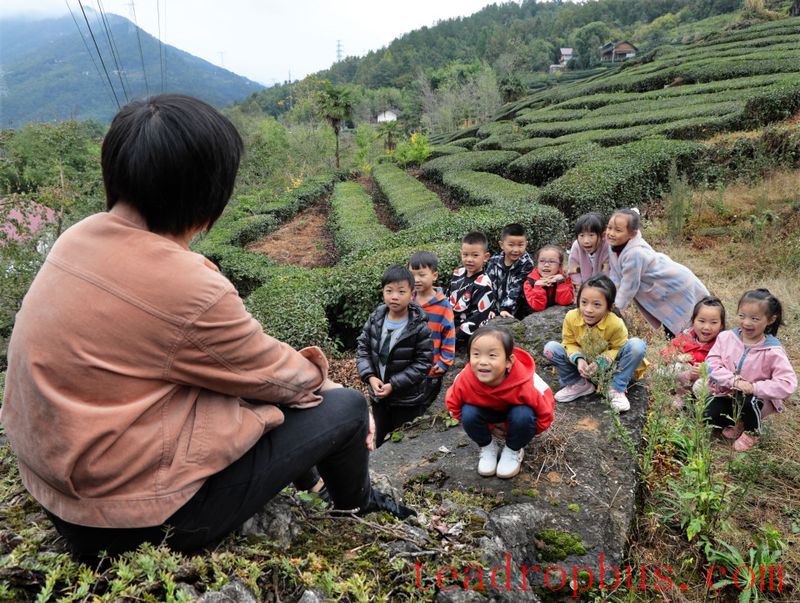
On October 15, 2025, in Xiaoh River Village, Wufeng Town, Wufeng Tujia Autonomous County, Hubei Province. Party Secretary Zhang Lijun, a graduate of Zhongnan University of Economics and Law, tells the children of the village the story of the “Seven Fairy Maidens of the Tea Mountain.” (Photographed by Li Yalong)
In the early days of the People's Republic of China, to develop foreign trade, the China National Tea Corporation built the Yidu Yihong Tea Factory, which managed the production of Yihong tea in sixteen counties across the three regions of Yichang, Enshi, and Changde in Hubei and Hunan provinces.
Following the signing of the Sino-Soviet Treaty of Friendship and Alliance, to further develop foreign trade, extensive labor competitions were held in the Yihong tea region. Xiaoh River Village in Wufeng County was a well-known tea-producing area. In March 1957, the county party work team and the village party branch organized a competition for skilled tea pickers. Those who picked more than 30 kilograms of fresh leaves per day were designated as “skilled pickers,” while those who picked more than 50 kilograms were named “super-skilled pickers.”
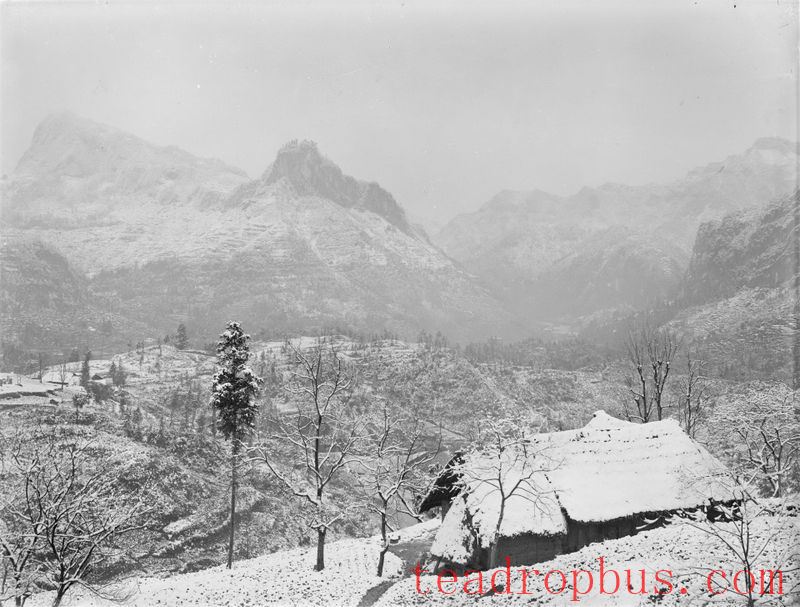
In 1909, in Changle County (now Wufeng Tujia Autonomous County), Yichang Prefecture, Hubei Province. Xiejiaping in the snow, the entrance to the core production area of Yihong tea. (Photographed by Henry Wilson)
The fourteen women who picked the most tea leaves in their teams were gathered for a competition. The weight of the tea leaves they picked each hour was measured, and the total after three hours determined their final score. Feng Shenglian, the oldest participant, picked the most at over 45 kilograms, followed by Wang Yingmei with over 40 kilograms. The top seven were selected as “skilled pickers,” and this group was named the “Seven Fairy Maidens of the Tea Mountain” by the village party branch.
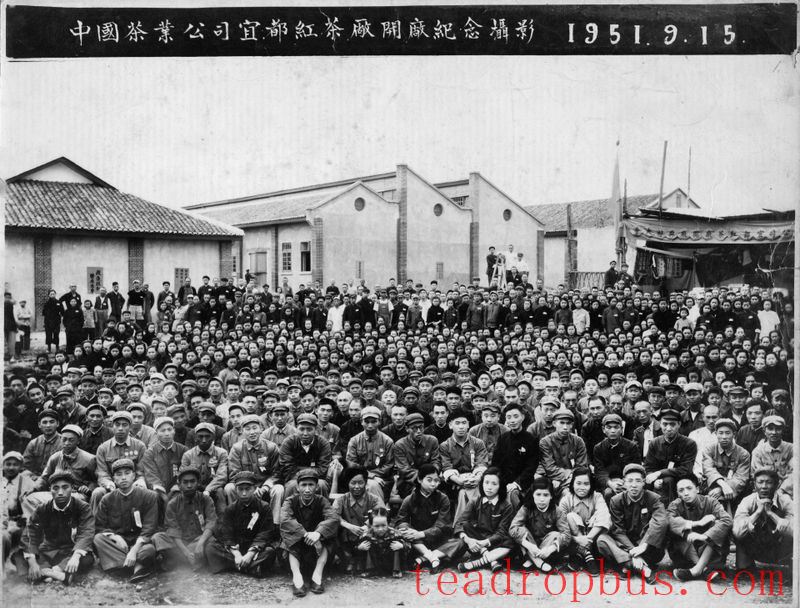
On September 15, 1951, in Yidu County, Yichang Prefecture, Hubei Province. The China National Tea Corporation South China Branch Yidu Yihong Tea Factory was established. A veteran of the Chinese Red Army led a group of demobilized PLA soldiers and recruited workers to produce Yihong tea for China's foreign trade after the founding of the People's Republic. (Photographer unknown, Yidu Yihong Tea Factory collection)
Soon after, the team sent 33.5 kilograms of dry tea (Maojian) made from the fresh leaves picked by the “Seven Fairy Maidens” in a single day to Chairman Mao. On August 30, the Secretariat of the Central Committee of the Communist Party of China wrote to the Wufeng County Party Committee and the “Seven Fairy Maidens,” informing them that the letter and 33.5 kilograms of tea sent to Chairman Mao had been received, and returned 200 yuan for the tea.
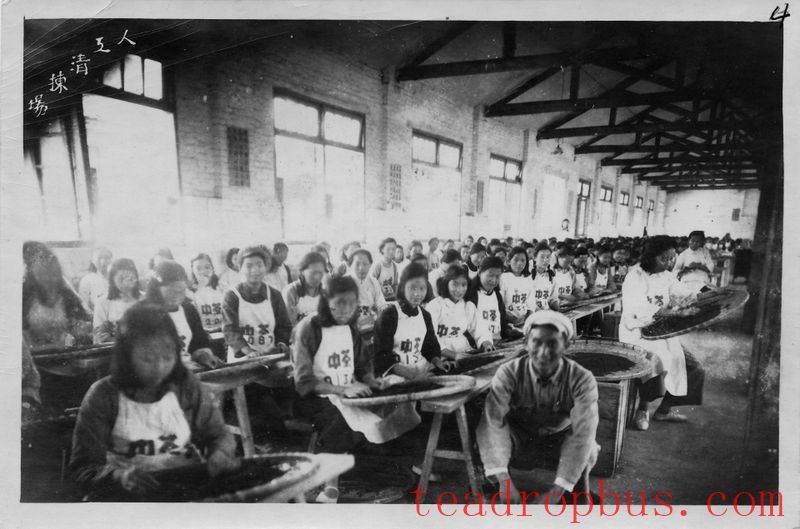
In 1951, at the China National Tea Corporation South China Branch Yidu Yihong Tea Factory, female workers were sorting Yihong tea. By October, there were 483 female workers divided into five detachments and thirty groups. (Photographer unknown, Yidu Yihong Tea Factory collection)
The story of the “Seven Fairy Maidens of the Tea Mountain” attracted attention from various organizations. On June 27, the Hubei Provincial Women's Federation sent a telegram, calling on all women in the province to learn from the “Seven Fairy Maidens” and “think boldly, act boldly, and innovate boldly.” On July 10, the All-China Women's Federation also wrote to the Wufeng Women's Federation, congratulating the Seven Sisters of the Tea Mountain on setting another new record for tea picking. On May 4 of the following year, the Hubei Provincial Party Committee also sent a telegram to the Wufeng County Party Committee, forwarding it to the Seven Sisters of the Tea Mountain, encouraging them to “keep up the good work, do a good job in the cultivation and management of summer tea, and strive for greater success with summer tea.” On May 25, a provincial tea field meeting was held in Wufeng, calling on the entire agricultural sector of the province to quickly launch a production surge to “learn from Wufeng,” “catch up with Wufeng,” and “surpass Wufeng.” On September 23, the Hubei Film Studio arrived in Wufeng and began filming the news documentary “The Seven Fairy Maidens,” based on the advanced deeds of the seven tea pickers from Xiaoh Agricultural Cooperative, completing the film in three days.
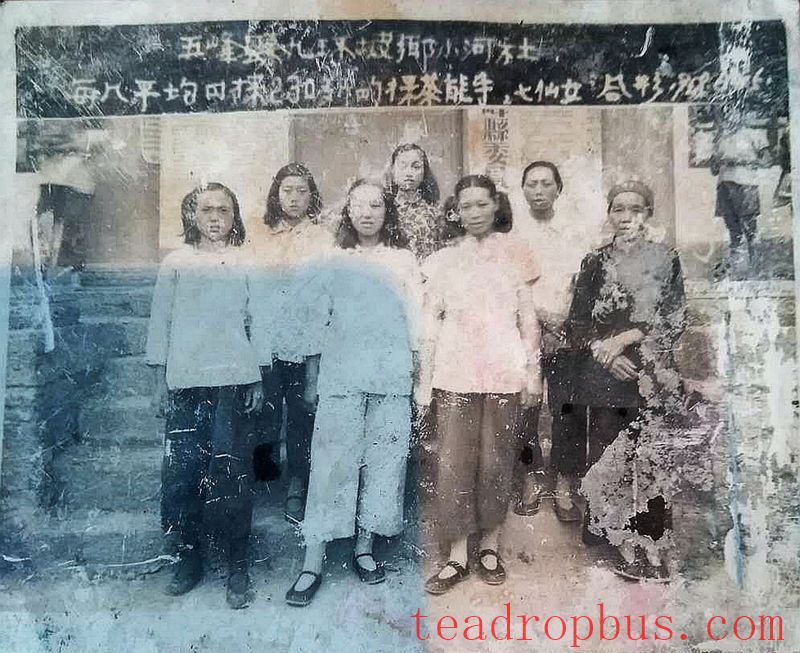
In 1958, in Wufeng County, Yichang Prefecture, Hubei Province, the “Seven Fairy Maidens of the Tea Mountain” pose for a photo in front of the Wufeng County Party Committee (from left to right in the front row: Sixth Sister Xie Chengmei, Fourth Sister Zhou Qiyu, Second Sister Wang Yingmei, First Sister Feng Shenglian; from left to right in the back row: Fifth Sister Xie Chengzhen, Seventh Sister Wu Fachi, Third Sister Du Yunyu). On August 30, 1957, the Secretariat of the Central Committee of the Communist Party of China wrote to the Wufeng County Party Committee and the “Seven Fairy Maidens,” informing them that the letter and the tea picked and processed in a single day and sent to Chairman Mao had been received, and returned 200 yuan for the tea. (Photographer unknown, collected by He Guilin)
Among the “Seven Fairy Maidens of the Tea Mountain,” Fifth Sister Xie Chengzhen stood out quickly with her excellent tea-picking skills. At the end of November 1958, the Wufeng County Party Committee received notice to send Xie Chengzhen to Beijing to attend the National Women's Congress.
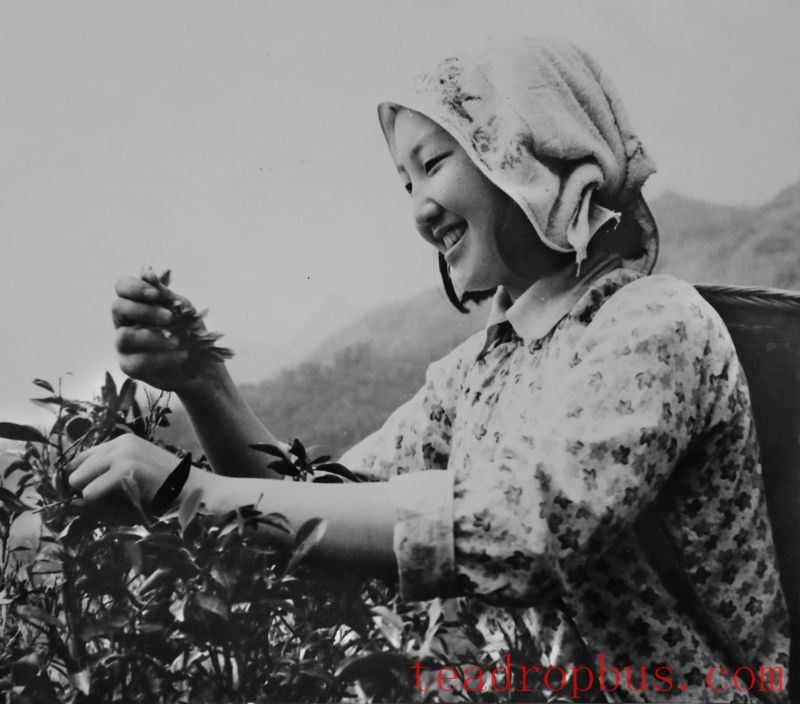
In 1959, in Xingyanping Township, Wufeng County, Yichang Prefecture, Hubei Province, Seventh Sister Zhang Zhilan, a skilled tea picker of the “Eight Fairy Maidens of the Tea Mountain,” picks tea. In 1958, she attended the National Youth Socialist Construction Activists Conference and was received by Chairman Mao and other central leaders. (Photographed by Li Guangyang, Hubei Daily, collected by Yin Jie)
The Jingju Opera “The Seven Fairy Maidens of the Tea Mountain,” created by the Yichang City Jingju Troupe, premiered on March 15, 1959, at the Yichang People's Theater. In the spring of 1960, the Yichang Jingju Troupe went to Wuhan to perform for the Second Party Congress of Hubei Province. “The Seven Fairy Maidens of the Tea Mountain” and the opera “The Red Guards on Honghu Lake” were collectively referred to as the “Three Red Flowers” of Hubei Province.